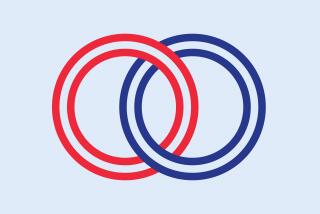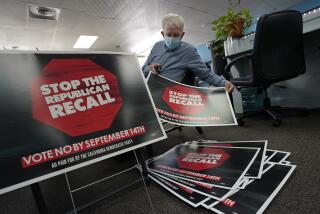Coalition Backs March Presidential Primary
- Share via
SACRAMENTO — A bipartisan group of legislators announced support Thursday for a bill that would move California’s presidential primary from June to March to give voters here more clout in picking presidential candidates.
The bill calls for the presidential primary vote in California to be held on the first Tuesday in March, a change sponsors hope would take some of the thunder away from the early voting states of Iowa and New Hampshire.
Even though Iowa and New Hampshire would continue to hold their elections in mid and late February, legislators believe the primary here would be a magnet pulling candidates to the West Coast.
“If you’re a candidate running for President, do you want to be in the snow, trudging around . . . or are you going to be in California?” asked Assemblyman Mike Roos (D-Los Angeles), who unveiled the legislation with Sen. William Campbell (R-Hacienda Heights) and Assemblyman Jim Costa (D-Fresno).
The coalition of Senate and Assembly lawmakers, composed of 42 Republicans and Democrats, came together less than three weeks after Gov. George Deukmejian dropped his opposition to the notion of an early primary and invited legislators to work with him on a bill.
Under the new bill, primary and general elections in California would continue to be held, as they are now, in June and November, even during presidential election years. The presidential primary is now consolidated with the June primary election during years when the nation votes on the presidency.
Estimates are that it would cost roughly $35 million to hold the extra presidential primary every four years. The high cost of the extra election has long been the stumbling block in efforts to move up the presidential primary. It was the principal factor cited by Deukmejian last year when he threatened to veto a presidential primary bill if the Legislature sent him one.
An early California primary has the potential to substantially alter the process of selecting presidential nominees. Early primaries in small states are much cheaper to campaign in and are accessible to lesser-known candidates who do not have vast campaign treasuries. There is concern among national political observers that an early California campaign would substantially narrow the field to the few candidates able to mount multimillion-dollar media campaigns.
Deukmejian is traveling in Europe and has not seen the Costa bill. But a spokesman said it sounded like something Deukmejian could support.
Costa and other supporters of the legislation have agreed to support Deukmejian’s efforts to put a constitutional amendment on the ballot that would ensure that future governors and lieutenant governors be members of the same party. That would be done by requiring them to run as a “ticket,” much the way the President and vice president do when they are elected.
Lawmakers can move up the presidential primary simply by changing election law. It doesn’t need voter approval.
As it is now, California is one of last states to hold its presidential primary and it often comes long after other states have decided who the candidates will be.
Costa said that last year 85% of the presidential convention delegates had been chosen by the time California got to vote.
Another problem lawmakers said they have with the current system is that candidates for President raise millions of dollars in campaign contributions that they spend in other states holding earlier primaries.
Roos called it “a colonial attitude,” saying candidates “use California to mine the gold” then ship it to Eastern primaries.
Costa said California’s late primary has made voters here “irrelevant” in deciding candidates for President, and he called the June primary election itself “anti-climatic.”
Another early primary bill has already been introduced, but its author, Republican Assembly leader Ross Johnson of La Habra is listed as a co-author of the Roos-Costa bill.
More to Read
Get the L.A. Times Politics newsletter
Deeply reported insights into legislation, politics and policy from Sacramento, Washington and beyond. In your inbox twice per week.
You may occasionally receive promotional content from the Los Angeles Times.










